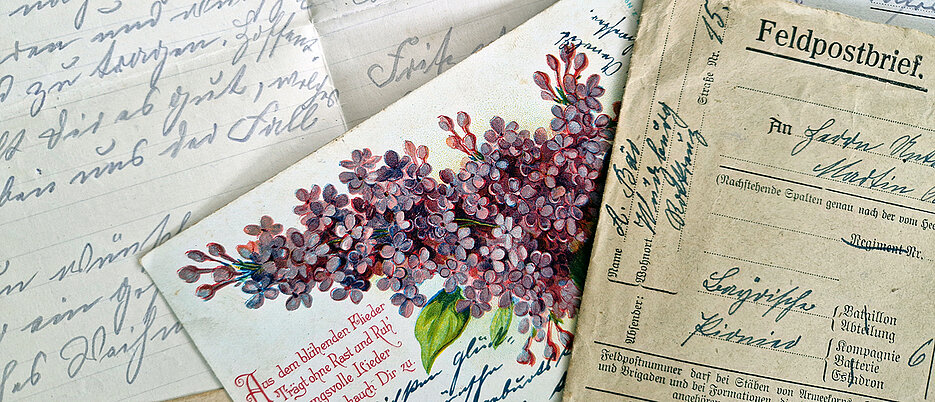Letters from the First World War: Invitation to a reading evening in Castell
08/30/2023Experiencing history up close and personal - that's what you can do on 23 September at a reading evening organised by the University of Würzburg in Castell. Some letters of the local Arnoldt carpenter family will be read aloud.

What did it mean for a 21-year-old craftsman to be called up for military service in the First World War? How did his mother, father and siblings experience this time in their home village? And: What did they write to their son and brother far away? Anyone who wants to get to the bottom of these questions is invited to a reading evening organised by the University of Würzburg (JMU) and the Castell Local History Society on 23 September 2023 at 6 pm in Castell Town Hall. The event is part of a cooperation project between the Local History Society and the reading group "Historical Self-productions" of Professor Michaela Fenske's Chair of European Ethnology.
"Testimonies of older generations rest in many attics and cellars: Letters, diaries, exercise books and photo albums," Michaela Fenske knows. "For descendants living today, however, these documents are usually no longer legible. We want to make this historical heritage accessible again." The reading evening will be about the power of writing and how letters between the front and the home village helped people survive the war.
In this way, the researchers want to provide an authentic insight into everyday life during the First World War in Lower Franconia. "Especially during the current world political situation, the letters from and to Castell, which are more than one hundred years old, can contribute to a better understanding of what unites and holds people together in extreme situations," say the members of the group.
Exploring Franconian cultural heritage with the help of citizen research
Since the winter semester 2020/21, the Chair of European Ethnology has opened certain reading courses of historical sources to interested citizens. In the meantime, a citizen research project has also grown out of the courses. Interested people read historical letters, diaries and other sources from Lower Franconia and discuss their contents. The members of the groups have themselves previously attended the chair's reading course and now practice reading old writings together. "That is sometimes quite difficult," knows Dr Susanne Dinkl, academic councilor and one of the group leaders. "But: opening up historical sources together is just great fun."
About the Chair of European Ethnology
The Chair of European Ethnology / Empirical Cultural Studies at the University of Würzburg, headed by Professor Michaela Fenske, is concerned with the study of everyday cultures. One focus is on the study of material and immaterial aspects of the present and history, such as values, traditions and social practices. Her research interests include studies on multi-species relations within the context of environmental humanities, the anthropology of the rural, the study of narrative culture and historical anthropology.
Further information on the event
https://www.phil.uni-wuerzburg.de/eevk/transfer/lesegruppe-fuer-buergerinnen-und-studierende/
Contact
Prof. Dr. Michaela Fenske, Chair at the Department of European Ethnology, Tel.: +49 931 31-89921, Mail: michaela.fenske@uni-wuerzburg.de






